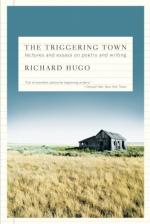
|
| Name: _________________________ | Period: ___________________ |
This test consists of 15 multiple choice questions and 5 short answer questions.
Multiple Choice Questions
1. Who remarks that American poetry could not help but get better and better?
(a) Mark Strand.
(b) David Wagoner.
(c) Yeats.
(d) Valery.
2. Hugo teaches that one way of getting into the world of the imagination is to focus on the play rather than the _____ of words.
(a) Context.
(b) Meaning.
(c) Syntax.
(d) Usage.
3. The grain elevator in one assumption is _____.
(a) Rusted through.
(b) Silver.
(c) Completely full.
(d) Lopsided.
4. Hugo says that for Roehtke, the rules are simply one way to help a poet get to _____.
(a) A master's degree.
(b) The gold.
(c) Heaven.
(d) Publish.
5. Hugo sits home on Saturday nights _____ in one assumption.
(a) Watching television.
(b) Listening to the radio.
(c) Eating fast food.
(d) Drawing comic book characters.
6. Hugo believes that after a long time and a lot of writing, a poet can go back to places of _____.
(a) Real personal significance.
(b) Cognitive recall.
(c) Insanity.
(d) Creative genius.
7. Hugo hopes that the student reading his book learns to write like _____.
(a) Himself.
(b) Yeats.
(c) The author.
(d) Auden.
8. Which clever, witty writer is described by Hugo as being able to conform the music of poetry to truth effectively?
(a) Himself.
(b) Pound.
(c) Yeats.
(d) Auden.
9. Who does Hugo put in the silo in one of his poems?
(a) Chorus girls.
(b) Soldiers.
(c) Large rats.
(d) Babies.
10. All the poets that Hugo knows have an unusually strong _____.
(a) Moral sense.
(b) Need for approval.
(c) Id.
(d) Taste for danger.
11. Which artist does Hugo think is interpreted as a weirdo when one first sees his paintings?
(a) Hieronymus Bosch.
(b) Salvador Dali.
(c) Claude Monet.
(d) Vincent Van Gogh.
12. Hugo thinks that Roethke is too _____ for his own good.
(a) Competitive.
(b) Arrogant.
(c) Detailed.
(d) Slothful.
13. What poem does Hugo describe as being "not good Hopkins"?
(a) "The Sea Took Pity".
(b) "The Handsome Heart".
(c) "The Silver Jubilee".
(d) "The Golden Echo".
14. At the risk of violating the facts, Hugo believes that the subject of a poem should serve _____.
(a) The words.
(b) As a reminder.
(c) The greater good.
(d) God's will.
15. Hugo vaguely recalls a class in 1948 when Roehtke defended _____ as important to creativity.
(a) Madness.
(b) Piety.
(c) Devotion.
(d) Starvation.
Short Answer Questions
1. How does Hugo describe Roethke's clothes?
2. What is the divorce rate in the town in one assumption?
3. Hugo advises that at all times, the student must keep his _____ on.
4. Hugo offers one way of getting off the triggering subject by suggesting that one use words for the sake of their _____.
5. What response from Roethke to a student's poem does Hugo find withering?
|
This section contains 417 words (approx. 2 pages at 300 words per page) |

|




